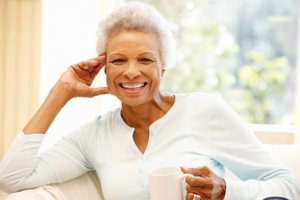The Elevated Danger of Dehydration in Seniors and How to Help

Seniors are among the group with the highest hospitalizations due to dehydration. Learn how to reduce the risk with these easy prevention methods.
Did you know that almost one half of all older adults are chronically under-hydrated, based on a new scientific study conducted at UCLA? Not just that, but seniors over age 65 account for the highest group of hospital admissions as a consequence of dehydration.
Dehydration can easily sneak up on seniors, who often have a reduced sensation of thirst, may experience medication side effects that cause hydration problems, or who erroneously believe that drinking less will decrease incontinence issues.
Senior dehydration can be extremely dangerous, increasing the risk for health issues which include:
- UTIs
- Kidney stones and/or failure
- Blood clots
- Seizures
- Hypovolemic shock
- And many more
Dehydration can be identified by the following symptoms:
First stages:
- Reduced amount/darker-colored urine
- Dry mouth
- Feelings of weakness, dizziness, and/or lower energy
- Muscle cramps
- Irritability
Advanced stages:
- Confusion and disorientation, including difficulty walking
- Low blood pressure levels and weakened, faster pulse and breathing
- Stomach bloating
- Sunken, dry eyes
- Skin that is wrinkled with no elasticity
- Worsened muscle cramps and contractions, and/or convulsions
While we often pay more attention to hydration when the air temperature is elevated, it is important for seniors to consume sufficient fluids throughout the year. A quick and easy formula to find out how much, on average, an older adult should drink every day is to divide his or her body weight by three, and have him or her take in that many ounces of water. As an example, if a senior loved one weighs 180 pounds, he or she would need to have a minimum of 60 ounces of water each day.
Try these guidelines to ensure the older adults you love stay healthy and hydrated:
- Plain water is best, but take into account other types of fluids, including soup, juice, fruits, and vegetables. Abstain from sugary and caffeinated beverages.
- Place bottled water, or a small pitcher of ice water and a cup, near the older adult to prompt him or her to sip on it conveniently during the day.
- Try various temperatures. Sometimes a warmed cup of water is more comforting than an icy one. You may even try heating up juice and other beverages to figure out if they are more appealing, or provide popsicles if needed.
The experienced in-home caregivers at Responsive Home Care are experienced in imaginative techniques to help older adults stay hydrated, and in monitoring fluid intake to ensure adequate fluids are consumed every day. Contact us at (954) 486-6440 to learn more about how we can help enhance the health of senior loved ones with home health care in Davie, FL and nearby areas, in the convenience and familiarity of home. We provide home care services throughout Broward County.
